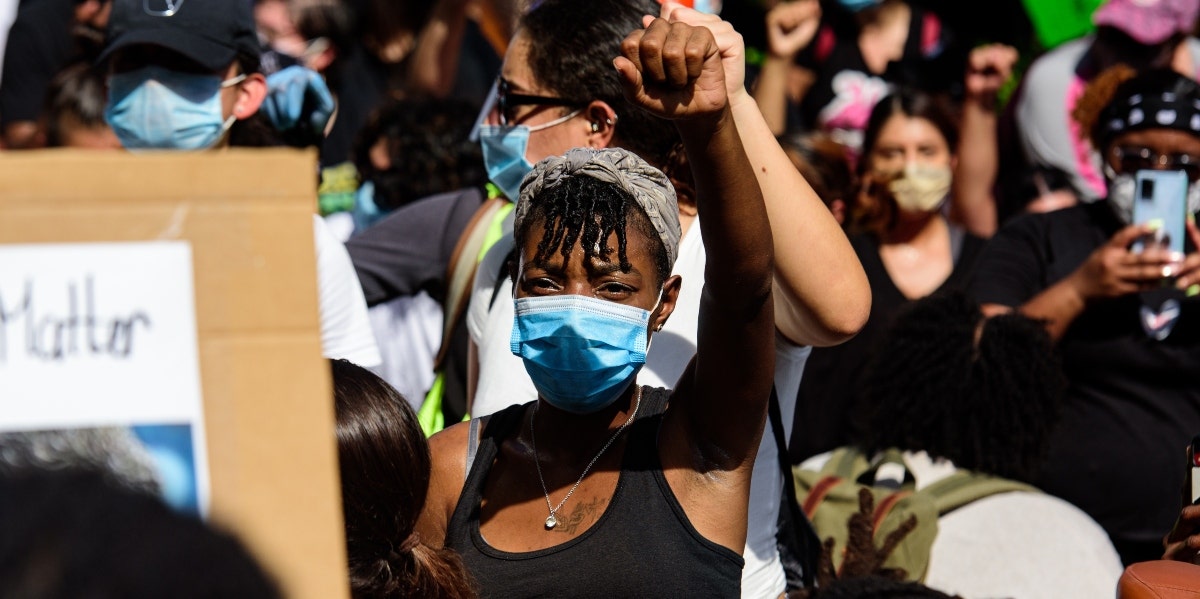5 Ways You Can Make A Difference In The Fight To Gain Justice For Victims Of Police Brutality And Systemic Racism
America isn’t “the land of the free” for black people.
 tverdokhlib / shutterstock.com
tverdokhlib / shutterstock.com I wanted to start off by talking about George Floyd, the unarmed black man who died at the hands of police brutality in Minneapolis.
But the truth is, police brutality against the black community stems far beyond this horrific event. George Floyd was not the first black person to die because of police brutality.
Unfortunately, I know he also won’t be the last.
Police brutality is not an isolated incident nor is it a rare occurrence within the black community. It is something that black people know all too well.
There are countless accounts of black people being treated unjustly by the so-called justice system, whether it’s getting an outrageous jail sentencing time in comparison to their white counterparts or getting murdered during an arrest for a crime they have not been found guilty of.
As the ongoing protests reveal, the murder of Floyd was the last straw that broke the camel’s back.
Black people and their allies could no longer tolerate the systemic racism in America nor its justice system built specifically to "control the behaviors of minorities."
This modern institution of systemic racism began with the war on drugs started by former U.S. President Richard Nixon as a way to manipulate the law so he could intentionally target black people and other minorities.
In 1994, President Nixon’s Aide John Ehrlichman admitted, “We [The Nixon administration] knew we couldn't make it illegal to be either against the war or black, but by getting the public to associate the hippies with marijuana and blacks with heroin. And then criminalizing both heavily, we could disrupt those communities. We could arrest their leaders, raid their homes, break up their meetings, and vilify them night after night on the evening news. Did we know we were lying about the drugs? Of course, we did."
The essential criminalization of black people was meant to keep the race oppressed and viewed as subpar citizens.
Nixon declared "the war on drugs" in June 1971, and the effects of this war still negatively affect the black community to this day.
The War on Drugs is a prime example of systemic racism in America. White people and black people historically do not receive the same sentencing for drug abuse, and drugs that are predominantly abused by white people faceless legal repercussions. These racial disparities unfairly prosecute black people.
Disgust for systemic racism and acknowledgment of white privilege, unfortunately, is not enough. If we want to end systemic racism, we must find ways to rectify our system to benefit all citizens. The new system must bridge the gap and erase disparities between black and white people and all other minorities.
Ways to get justice for victims of police brutality and systemic racism:
1. Sign petitions for racial justice.
One of our rights as Americans is the right to petition. Let your lawmakers know that you care about the injustices happening within the black community by signing petitions. Don’t allow your voice to be silenced in a time of great injustice in our nation.
2. Go to police brutality and race-related protests.
Exercise your right to protest. Protests have the ability to show unity among citizens in the fight against injustice. They bring awareness to the struggles of a specific demographic. Protests get media coverage and that will get the message out there which helps gain potential supporters and will pressure lawmakers and politicians to acknowledge the need for change.
3. Donate to the cause.
Use your money to fund causes that support the Black Lives Matter Movement. Money can do a lot to invoke change and start initiatives to progress racial equality. If you aren't able to physically help, help the movement financially.
4. Attend local public forums.
Public forums are great to express how you feel about what is going on in your community. Allow your voice to be heard freely at a public forum because your rights grant you freedom of speech. It allows the community and it’s leaders to propose potential solutions to the problems presented.
5. Vote for politicians who are active anti-racists.
This has been said a million times, but you need to make sure you vote. Every single vote makes a change. Don’t take what your ancestors fought for you to be able to do for granted. Exercise your right to vote, so politicians that are actively working to help you can get elected into office.
Tamara Sanon is a writer with a passion for covering topics about health and wellness, lifestyle, astrology, and relationships.

